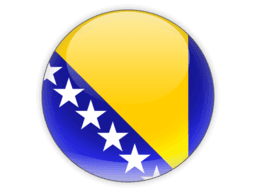
Regions of Bosnia and Herzegovina
Explore 3 regions
Cities of Bosnia and Herzegovina
Discover 50 cities across 3 regions
Bosnia and Herzegovina, often referred to simply as Bosnia, is a country located in southeastern Europe, bordering Croatia to the north and west, Serbia to the east, and Montenegro to the southeast. The country has a diverse population, with Bosniaks, Serbs, and Croats being the largest ethnic groups. The official languages are Bosnian, Serbian, and Croatian.
Bosnia's economy is mainly based on services, with tourism being a major contributor. The country has a rich cultural heritage and natural beauty, including historic cities, beautiful landscapes, and a diverse cuisine. The country also has some natural resources, including coal, iron ore, and bauxite, but these sectors are not as developed.
Bosnia and Herzegovina is a parliamentary republic, with a Presidency consisting of three members serving as the collective head of state and a Prime Minister serving as the head of government. The country is divided into two entities: the Federation of Bosnia and Herzegovina, which is mainly inhabited by Bosniaks and Croats, and the Republika Srpska, which is mainly inhabited by Serbs.
Bosnia and Herzegovina has a rich cultural heritage, influenced by its location at the crossroads of different civilizations. The country has a variety of festivals and celebrations throughout the year, including the Sarajevo Film Festival, which is one of the largest film festivals in southeastern Europe. The country is also home to many historic sites, including the Old Bridge in Mostar, which is a UNESCO World Heritage site.
Despite its many strengths, Bosnia and Herzegovina faces challenges such as high unemployment, corruption, and political instability. The country has taken steps to address these issues, including implementing economic reforms, investing in infrastructure and education, and working towards European Union membership.
National holiday
Independence Day, 1 March (1992) and Statehood Day, 25 November (1943) - both observed in the Federation of Bosnia and Herzegovina entity; Victory Day, 9 May (1945) and Dayton Agreement Day, 21 November (1995) - both observed in the Republika Srpska entity
note: there is no national-level holiday
Telephone Code
387
Local Emergency Phone
Ambulance: 124; Fire: 123; Police: 122
Vaccinations
See WHO recommendations
Climate
Hot summers and cool winters; areas of high elevation have short, cool summers and long, severe winters; mild, rainy winters along coast
Currency (Code)
Konvertibilna markas (BAM)
Electricity/Voltage/Plug Type(s)
230 V / 50 Hz / plug types(s): C, F
Major Languages
Bosnian, Serbian, Croatian
Major Religions
Muslim 50.7%, Orthodox 30.7%, Roman Catholic 15.2%, atheist 0.8%. Agnostic 0.3%, other 1.2%, undeclared/no answer 1.1%
Potable Water
Opt for bottled water
International Driving Permit
Suggested
Road Driving Side
Right
Tourist Destinations
Sarajevo; Mostar (includes Old Bridge); Blagaj; Pocitelj; Kravica Waterfalls; Stecci Medieval tombstone graveyard; Medjugorje
Major Sports
Soccer, basketball
Cultural Practices
Most hostels will request you to remove shoes before entering.
Tipping Guidelines
It is common to leave a 10-15% tip for good restaurant service. Bartenders and wait staff do not include a tip on the bill. Taxi drivers will often round their fare up, but a few extra markas will go a long way. A tip of 50 cents (USD) a night is appropriate for hotel maid staff.
Souvenirs
Wood-carved items, copper cookware and brassware, ceramics, handmade carpets, hand-embroidered clothing and linens, leather boxes, liquor
Traditional Cuisine
Ćevapi — grilled ground beef kebabs served with chopped raw onions
Geography
Area
total: 51,197 sq km
land: 51,187 sq km
water: 10 sq km
Climate
hot summers and cold winters; areas of high elevation have short, cool summers and long, severe winters; mild, rainy winters along coast
Natural resources
coal, iron ore, antimony, bauxite, copper, lead, zinc, chromite, cobalt, manganese, nickel, clay, gypsum, salt, sand, timber, hydropower
People and Society
Population
3,807,764 (2023 est.)
Ethnic groups
Bosniak 50.1%, Serb 30.8%, Croat 15.4%, other 2.7%, not declared/no answer 1% (2013 est.)
Languages
Bosnian (official) 52.9%, Serbian (official) 30.8%, Croatian (official) 14.6%, other 1.6%, no answer 0.2% (2013 est.)
Religions
Muslim 50.7%, Orthodox 30.7%, Roman Catholic 15.2%, atheist 0.8%, agnostic 0.3%, other 1.2%, undeclared/no answer 1.1% (2013 est.)
Population growth rate
-0.23% (2023 est.)
Government
Government type
parliamentary republic
Capital
name: Sarajevo
Economy
Economic overview
import-dominated economy; remains consumption-heavy; lack of private sector investments and diversification; jointly addressing structural economic challenges; Chinese energy infrastructure investments; high unemployment; tourism industry impacted by COVID-19
Real GDP (purchasing power parity)
$51.244 billion (2021 est.)
Real GDP per capita
$15,700 (2021 est.)
Agricultural products
maize, milk, vegetables, potatoes, wheat, plums/sloes, apples, barley, cabbages, poultry
Industries
steel, coal, iron ore, lead, zinc, manganese, bauxite, aluminum, motor vehicle assembly, textiles, tobacco products, wooden furniture, ammunition, domestic appliances, oil refining
Exports
$9.948 billion (2021 est.)
Exports - partners
Germany 14%, Italy 12%, Croatia 11%, Serbia 11%, Austria 9%, Slovenia 8% (2019)
Exports - commodities
electricity, seating, leather shoes, furniture, insulated wiring (2019)
Imports
$12.726 billion (2021 est.)
Imports - partners
Croatia 15%, Serbia 13%, Germany 10%, Italy 9%, Slovenia 7%, China 6% (2019)
Imports - commodities
refined petroleum, cars, packaged medicines, coal, electricity (2019)
International Airports in Bosnia and Herzegovina
Discover 4 major airports serving Bosnia and Herzegovina
Mark Bosnia and Herzegovina as Visited
Add Bosnia and Herzegovina to your personal travel map and track your journey around the world. Share your adventures and see your progress grow!